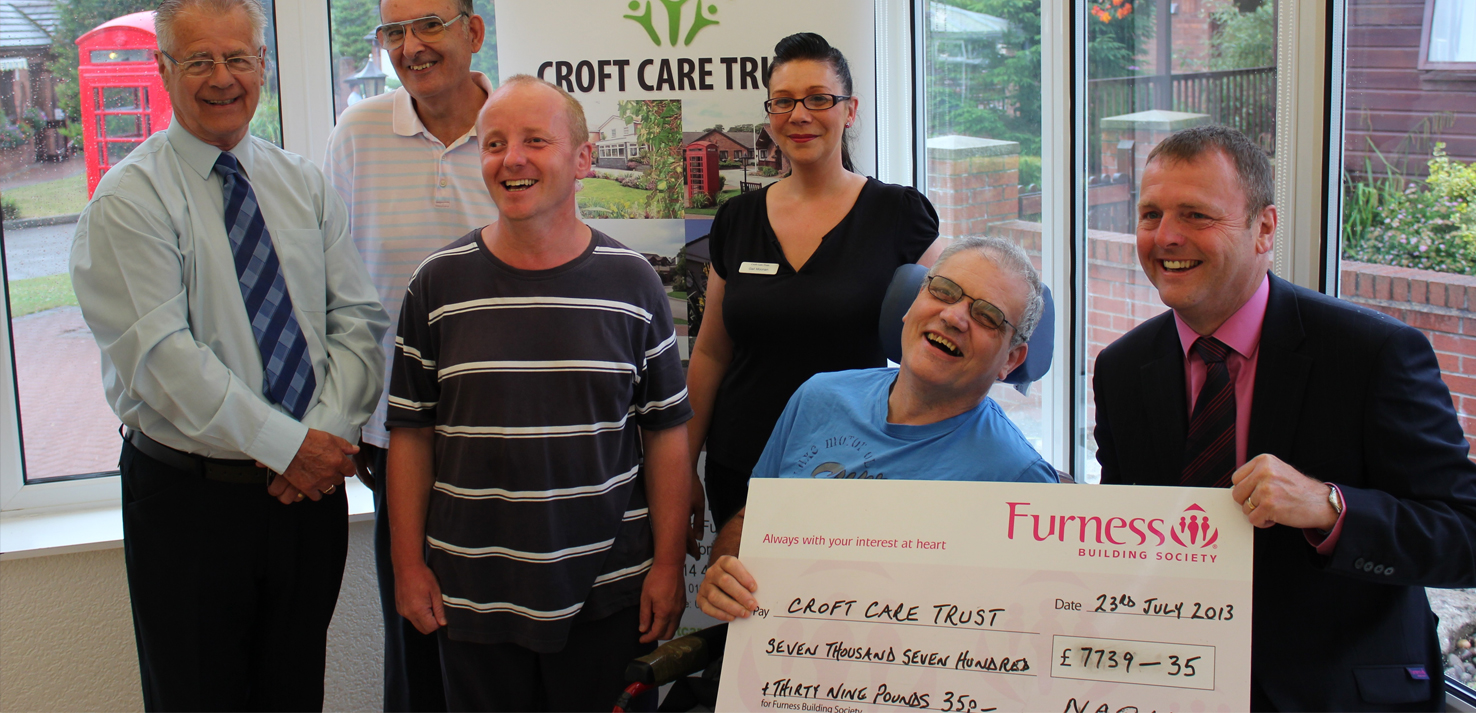Month: July 2019
Giving hope to the homeless
Behind a row of terraced houses on the outskirts of Egremont lies a sanctuary. An allotment run by Calderwood House, a homeless hostel providing up to six months respite for those in need.
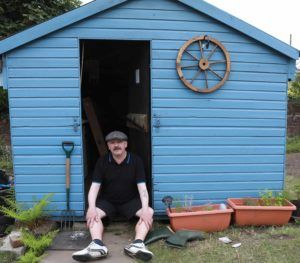
Since opening in 2015, Time to Change (West Cumbria), which runs the hostel, has helped more than 170 people get back on their feet. For many who are supported by the social enterprise, this is a place to relax, learn new skills and be with new friends.
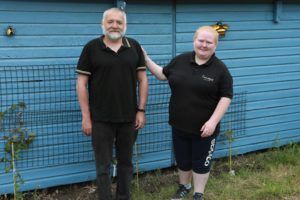
This little oasis of peace offers a place to go when residents need some time to reflect and gather their thoughts. In the allotment, not only will you find fruit, vegetables and flowers, a cherry tree flourishes in the corner. It was recently planted for a resident who lost his life – a tragic story that will never leave the devoted team. Their energy, motivation and commitment to help people is commendable.
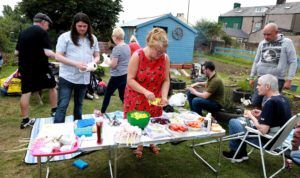
Billy, 26, became homeless when his family circumstances changed after a tragic incident. Not only was he subjected to a savage attack, he had also been living without gas and electricity for a year. He said: “It wasn’t safe for me to stay at home, I had nowhere to go.” Billy spent months at Calderwood House recovering. Since moving out, he now has a house nearby. He still enjoys visiting the Calderwood House team most days. They continue to support him, including helping him to apply for an online university course.
At Calderwood House, residents learn to live together in a community, sharing the cooking and cleaning, as well as developing skills and knowledge through work experience and training. You will often find residents helping in the community, including street cleaning and litter picking. One of the conditions of their stay is they stay free from drugs and alcohol, and testing is carried out.
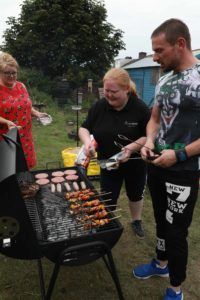
Father of three, Lee, left the army in 2009 when his life spiralled out of control. After many troubled years of abusing drink and drugs, the 31 year old became homeless. He said: “With the support of Calderwood House, I now have my own home and work as a Security Guard. I can support my daughters and now look forward to a bright future.”
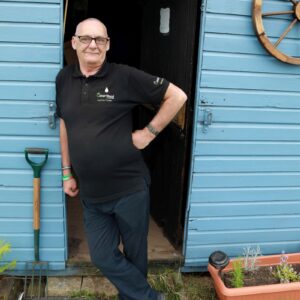
Rachel was born and raised in Whitehaven. After becoming homeless in her teens, she spent many years working hard to move out of poverty and create a better life for herself.
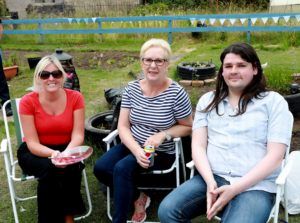
The first grant gave Rachel the opportunity to create eight new jobs. She said: “Staff are trained to a high standard to ensure our residents have the best support available to them. Time to Change also offers employment to those who may have been homeless, an ex-offender, or have faced mental health issues or addiction. We recognise our employees with lived experience often go over and above for our residents. I have personally experienced homelessness, drug addiction and severe mental health illness. It makes me who I am. Seeing my recovery and hearing my story gives others hope that there is a bright future out there.”
Another grant supported the purchase of a mobile coffee van from which residents sell its own brand blended coffee. You will often see new member of staff, Deb and Keith with the van at local events fundraising for Calderwood House. The coffee is packaged in-house and sold to the consumer market. For the residents, the purchase of the van not only meant new training but also paid employment.
The world of the homeless is a tough place. More and more people are facing homelessness and housing problems. Calderwood House will continue to save lives and support people at their most vulnerable.
Addiction has no prejudice
“I liked to have a drink and would often have a glass of wine in the evening but then alcohol became my crutch. I found myself opening the wine and drinking the whole bottle.” This is a common statement in our current society and for some it can be the start of a downward spiral.
Alcohol-related hospital admissions in Cumbria are worse than the average for England. Cumbria Alcohol and Drug Advisory Service (CADAS) aims to address and reduce the negative impact of problematic drug and alcohol use on individuals, their families and communities.

Helen Davies, one of the charity’s three clinical supervisors, said alcohol continues to be the substance most affecting local people. But the charity’s staff and volunteers are seeing evidence that people are increasingly mixing their alcohol use with dabbling in cocaine, with potentially damaging long-term consequences. “More people are accessing our service because of cocaine, and there are a lot of people using it recreationally while they are having a night out in town,” said Helen.
Brian, 40, started drinking at the age of 14. He describes his addiction growing from alcohol to ecstasy to cocaine before ending up in jail, where he started using heroin. “When I came out I was stealing from people, I was constantly asking for money. I was manipulating people. I didn’t think I had a problem. I thought I didn’t need recovery and that I could do it my way.”
He stopped using drugs and alcohol and received help from The Well in Barrow and put on the 12-step programme. He had talking therapy with CADAS and ten sessions of black box therapy – a TENS machine stimulates the body’s production of natural endorphins. This helps reduce stress, anxiety, improve sleeping patterns and the body to heal.
Recently, Brian saw his mother for the first time in a while. She said that him walking away that day was the hardest thing she ever saw, because for the first time in her life she wanted him to stay, not leave.

CADAS uses volunteers to support people through their recovery and reintegration into the community. £24,000 from the United Utilities Legacy Fund employed a Volunteer Coordinator in West Cumbria. More recently, £30,000 was awarded to support the wages of a Recovery Volunteer Coordinator and increase the number of volunteers in Barrow over the next three years.

Phil Caine, a CADAS volunteer who became an employee and now coaches people in recovery, said: “Volunteering is part of my own recovery. I live the 12-step programme. I wanted to work with CADAS and use my knowledge of addiction and drugs. There is the behavioural side of addiction, that’s a lot of what we do here, helping people figure out what is underneath the addiction.”
Addiction has no prejudice. It doesn’t discriminate, no matter where you are from, how old you are or what job or school you go to. There is no getting away from the fact that addiction can happen to anyone of us.
Funding awarded to local groups in Barrow
Charitable causes in and around the Barrow area have received a share of almost £55,000 to support some of the most disadvantaged people across the peninsular.
Eight community groups received a share of the funds at Cumbria Community Foundation’s recent Barrow Community Trust grants panel. The funding will support activities to increase confidence and self-belief of young people and the production of a video to break down local barriers and stigma around substance misuse.

Andrew Bass, Business Development Officer for Barrow & South Lakes said: “Following on from last year’s pilot project, which the Foundation also supported, we have since secured part funding from National Lottery Community Fund and Children in Need to develop the project over the next three years. We are delighted that a local funder has continued to make our delivery bigger and better than before and to enable us to support even more local children.”
The Well Communities CIC, based on Dalston Road, received £3,000 from the Robinson Family Fund and the Barrow Community Trust Fund.
Working in partnership with Signal Film and Media, a series of film-making
Ged Pickersgill, Senior Development Manager, said: “We hope the short film production will break down local barriers and stigma around substance misuse. The project will work with recovering addicts to record interviews that will allow them to share their story in a supportive environment.”
Ellen Clements, Grants and Donor Services at Cumbria Community Foundation, said: “Organisations like The Well are essential in tackling issues in the local community and with help from the funds managed by the Foundation they can make a real difference.”
Applications for the next round of funding need to be submitted by Friday 13th September 2019. For more information or to apply visit www.cumbriafoundation.org or contact the grants team on 01900 825760.
£100,000 up for grabs for Cumbria youth projects
Projects that encourage young people to take action on the issues that matter to them can apply for up to £5,000 through the #iwill Fund.
Administered by Cumbria Community Foundation, the #iwill Fund creates opportunities for skills development for young people including social action through campaigning, fundraising and volunteering, all of which make a positive difference to their communities. Projects could be online, extra-curricular, informal or in already created groups.

The #iwill Fund was set up by the Department for Digital, Culture, Media and Sport and The National Lottery Community Fund. This year in Cumbria, it is supported by property firm, BEC, which has donated £25,000 in match-funding to support projects in West Cumbria as part of its Giving:BEC initiative.
BEC’s CEO Michael Pemberton, said: “We are acutely aware of the role our business plays in our local communities, and are proud of the impact we have made to date. Giving:BEC gives us the framework to build on our achievements and help further improve the lives of local people.

Annalee Holliday, Grants & Donor Services Officer at Cumbria Community Foundation, said: “Young people have enormous potential to make a positive change in their communities. We want to fund enjoyable projects that build and share skills and demonstrate positive impact on the wider community including simple, basic things like making new friends, trying out new activities and improving life skills.
“We’re proud to support local groups working with the next generation of volunteers, campaigners and activists who want to make a difference.”
To find out more visit: https://www.cumbriafoundation.org/fund/iwill-fund or contact the grants team on 01900 825760.
Money available from Cumberland legacy fund
Cumbria Community Foundation is urging more community groups to apply for funding through the Joyce Wilkinson Trust Fund.
The funding is available to community groups in the former county of Cumberland, especially those in the Rosley and Westward, Caldbeck, Wigton and Aspatria parishes.
Grants are distributed from the fund twice a year and the Foundation is looking for more applications for the next panel in December, especially from projects supporting older people, children and young people.
Ellen Clements, Senior Grants and Donor Services Officer at Cumbria Community Foundation said: “We are enormously proud to have been able to carry on Joyce Wilkinson’s legacy since 2008. Many local projects have benefited from a share of £428,000.”
Last month, £42,764 was awarded to ten different community organisations, including
Aspatria Community Centre, Wigton Theatre Group, Northern Fells Group and Rosley Church.
Wigton Theatre group, received a grant for £9,000 to improve its facilities. The grant will be used to refurbish the seating in the auditorium and hopefully increase audience levels and community participation.
Dennis Graham, Chairman said: “We are extremely grateful for the generous grant from the Joyce Wilkinson Trust as we believe this will encourage matched funding from other organisations as well as improve our facilities. Other aspects of the project include fitting new front doors, refurbishing the worn-out roof and renewing the toilet facilities. We now have several partners in this drive to secure the future of the theatre – Allerdale Borough Council, Wigton Town Council, Cumbria Community Foundation, Joyce Wilkinson Trust, Hadfield Trust and other private donations. We regard our role very much as a community facility and make the theatre available to all.”

Applying to the Foundation for a grant is straight forward and staff are always looking to help organisations with their applications.
The deadline for applications to the Joyce Wilkinson Trust Fund is 8th November 2019. For more information about how to apply, contact Ellen Clements by phone 01900 825760 or by email ellen@cumbriafoundation.org
Showing care for those in despair
In one year alone, west Cumbrian charity, Allerdale Disability Association (ADA), unlocked more than four million pounds worth of benefits for people with disabilities.

For most people it helps, it is a life changing service. But for others, the wait, the uncertainty, and the stress, is too much. ADA knows of people who have been driven to thoughts of suicide. Four men have taken their own lives waiting for their benefits appeals to be heard.
Last year, ADA, based in Moorclose Community Centre in Workington, helped 900 people through its information service.
Paul Parkinson, Information and Benefits Advisor, helps people navigate 
He said: “People are living on money from family, friends, fresh air or they are getting into debt.
“Three of my clients have committed suicide in three years. I went to an appeal tribunal with the widow of a fourth. I try to help clients with everything from filling in forms to appeals and supporting families during the tribunal hearings in court. Just last week, £80,000 of benefits were claimed back for clients after being turned down.”

Despite this grim picture, there is hope. One client, 58 year old Paul, saw his benefits halve under the new system. Thanks to ADA, his benefits were fully restored. He said: “It made a lot of difference; it was really helpful.”
While getting people’s benefits payments are a life-changing aspect of ADA’s work, it is the regular weekly support that changes the quality of life for its members.
Twice a week, the doors of the centre are thrown open and anyone with a 
In addition to the normal activities, the charity also organises trips to various places and in 2004, after hearing that the local Talking Newspaper group was to disband, the charity took it over and a team of volunteers have continued to record the weekly disc ever since.

Cumbria Community Foundation has given more than £138,000 to ADA since 2002. Tracey said: “It costs £68,000 a years to run the charity. The Foundation is a godsend. Its continued support has kept us open and has helped us unlock funding from other sources.”
Tracey has worked for the charity for 21 years. Its current chairman, Peter Mallyon, has been part of ADA for 25 years. Both are committed to providing a safe and supportive place for people living with disabilities.

ADA will continue to help west Cumbrian’s through the appeals process with the help from external funding. However the debt, frustration and stress ensued is causing people’s health to deteriorate and in some cases making their disability worse.
Funding available for students working towards land-based qualifications
Students being educated for the farming, forestry and horticultural industry are being encouraged to apply for funding.
The Swales Trust Fund, administered by Cumbria Community Foundation, awards grants of around £500 to support students who are working towards land-based qualifications. The funding can be used to purchase study materials, specialist equipment and towards course fees and exceptional travel costs.

Carol Douglas from Sedbergh received a grant towards the cost of a woodland ecology course at the Green Wood Centre near Telford. Working part-time and a parent of two teenage children, she was unable to afford all the costs involved in attending the course to further her professional development within the forestry industry.
Carol said: “I have gained a breadth of knowledge that will be useful in my workplace. The grant gave me the motivation to look into available woodland courses and encouraged my employer to support me in this process. It has also spurred me very much into wanting to learn more.”
Another applicant from Cumbria was awarded the grant to enable her to complete a three-year part-time horticultural course over one year.

Ellen Clements, Senior Grants Officer at Cumbria Community Foundation said: “We’re very proud to be managing the Swales Trust, which helps people who wish to pursue a career in the land-based sector. Given the rurality of Cumbria, it is essential that we invest in our future farmers, foresters and landscapers.”
Applications are accepted all year round.
To apply visit www.cumbriafoundation.org or for more information contact Ellen Clements on 01900 825760 or email ellen@cumbriafoundation.org
Mental health rehabilitation saving tax payers thousands
Helping only one person with their mental health recovery can save the community £60,000*.
A Cumbrian judge deferred a local man’s prison sentence after the intervention of Mind in West Cumbria. During sentencing, the Judge said: “I am delighted to read of your progress. I am delighted that you have responded to the help. There is no question that was it not for the support [of Mind in West Cumbria], I would have been imposing a custodial sentence.”

One in four people are likely to suffer from diagnosable mental health problems. Mind in West Cumbria works with other agencies and local partners to support around 100 people per week.

Dr Brian Campbell, Chairman, said: “We try to see people immediately, especially if there’s a threat of self-harm. We can give some time and activity that a GP doesn’t have time to do. We can go a long way to tackle mental health problems such as anxiety and depression, and, in some instances, self-harm and suicide.”
A young single mother, with no family of her own to turn to, was struggling with mental health. She is now a trainee manager and pursuing a university degree. She said: “I am only alive and beginning a life now because of MIND. Many people I have known never had the help and support I did, and sadly took their own life. MIND are paramount to people suffering like myself and so many others. They are the difference between life and death.”

Over the years, funding has also supported volunteer training and mentor schemes, drop in sessions and activity costs, such as photography.
The Open Mind project helps people to overcome barriers to employment. It was developed when a local young man, who was bullied for much of his school life, suffered from anxiety.
The project offers training in personal social skills and basic education, alongside other therapeutic support. It aims to increase employability – helping members to reach their potential and fulfil their aspirations.
Dr Brian Campbell continues: “We are delighted at the project’s success. It has supported 80 people and the fact it has now succeeded for this young man is the ‘icing on the cake’ for us. He’s joined the gym and a community group and is looking at starting at the local college.”
The Open Mind project also helped a 15 year old girl who dropped out of school and made a serious attempt to end her life. She was supported throughout this traumatic time and continued with her academic studies. She has now been offered an apprenticeship.
Mind in West Cumbria gives people a way forward. It helps them to understand their options, offers practical and emotional support and lets them know that they’re not alone. Brian concludes: “We help people rekindle their ambitions, which may seem limited due to illness, so that they can thrive as individuals.”
* the estimated cost of an adult custodial sentence to the community per year.
“I hadn’t learnt how to be a parent from my own Mum and needed some help with my baby.”
Imagine how frightening it is to be 18 years old and pregnant with no one to support you. Cumbria Family Support has been helping families break through the issues and challenges they face for 25 years.
A local 18 year old with a troubled childhood sought help when she was pregnant with her first baby. She worried about the future for herself and her child. Thanks to Cumbria Family Support, she now has 3 children who are flourishing.

Cumbria Family Support helps families who are experiencing difficulties in their own homes. Recently moving into the Allerdale area, the charity has been delivering services to families in Carlisle and Eden for 25 years with the support of over £63,000 of grants from Cumbria Community Foundation. Support workers and trained volunteers provide tailor-made practical and emotional support. Other services include parenting programmes, youth clubs and individual and group work sessions. The charity also manages the Child Contact Centre in Carlisle.
The first grant was awarded in 2006 and again in 2009 to train more volunteers to help with parenting, respite and offer a listening ear. In 2011, the ‘Best Buddies’ project received a grant to work with children aged 5-11 to promote positive relationships and develop awareness of personal safety.
In 2016, a grant helped towards the cost of a support worker to provide emotional resilience work. JP, aged 7, lives with her mum and an older teenage sister. Following her father’s sudden death, the school nurse referred her for emotional support. JP’s feelings started affecting her school and social life. The support worker helped JP to process her feelings about her father and his death. She became more confident, less withdrawn and more able to engage in all that school has to offer.

Pam Hutton, Chief Officer said: “We have had fantastic support from Cumbria Community Foundation. As for all charities, fundraising is an ongoing and challenging process. We are reliant on the good will of our fantastic volunteers and the grant making trusts that fund our work.”
The charity has more than 40 volunteers who befriend families, visiting them once a week. One volunteer said: “Some of the families have many professionals in and out of their lives. I am providing continuity to a family that has never had it before.”
Pam continues: “Volunteers are the heart of the organisation. They are recruited from the community and understand the local needs. Volunteers come from all walks of life. They could be a retired professional who has known us from their work or a young person wanting to gain experience in the care profession. Parents who have received our support have become volunteers because they know how our services helped them.”
West Cumbrian causes awarded a share of more than £104,000
20 charitable groups across West Cumbria have received £104,000 to address a range of issues including anti-social behaviour, domestic violence and improving health and wellbeing.
The money came from 20 grant making funds, administered by Cumbria Community Foundation, including those set up by local businesses such as Cumbria Housing Partners, Doosan Babcock, Lamont Pridmore and Shepley Engineers.
Nine young people also received a share of £7,482 towards school trips and a postgraduate apprenticeship.
Castle Hill Trust CIO, which manages The Settlement in Maryport, received £1,500 from the Abbeyfield Carlisle Society Community First Fund and the Solway Fund for its ‘Over Here, Over There’ Community Festival.
Jim O’Rourke, Chair of the Trustees said: “We are delighted to receive funding for our community festival in September this year, celebrating the rich heritage of migration and maritime endeavour in the town.”

The Castle Hill Trust also received £3,000 to set up a Men in Sheds project in the cellar. A volunteer woodwork teacher will oversee the weekly workshops and address social isolation of older men in the town.

This service is free of charge to all those who need it. Project manager, Carole Launder, said: “The grant enables us to continue providing a free counselling service. We aim to break down the barriers that prevent individuals and families accessing help.
“We work with families suffering from the trauma of domestic and sexual abuse. The service is based on referrals, either from a member of the family or from a trusted partner – our second largest source of referrals is Children’s Services and the Police.”
A community café in Mirehouse received a £2,000 grant from the Shepley Group Fund to cover its rental costs.
Mirehouse Community Centre Association runs the Top of The Shops Café on Meadow Road, which was formerly the local library.

Annalee Holliday, Grants & Donor Services Officer at Cumbria Community Foundation, said: “There are many worthy organisations that continue to provide help to the local communities. In particular the grant to support families affected by domestic violence will make a positive difference to the most vulnerable people in our community. We are ever grateful to the generosity of our fundholders to enable us to support these vital services.”
The closing date for Cumbria Community Foundation’s next West Cumbria grants panel is 18th September 2019. For more information, visit www.cumbriafoundation.org or call a member of the grants team on 01900 825760.


